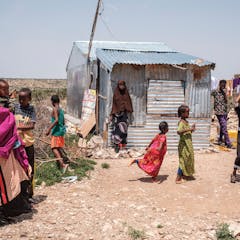
Articles on Environmental degradation
Displaying 1 - 20 of 26 articles

Legally binding deals struck with landholders can help protect and restore the environment over the long term.

Wars are multiplying – and the damage these conflicts do isn’t just immediate. They leave long-term environmental damage

The world’s ecosystems need to be restored – and fast. Large corporations are well-placed to do so.

Exploring the potential intersections between climate change and violence against children is crucial.

Energy firms are likely to lie about their corporate social responsibility to the environment. Their deception can be turned around for good if they are held accountable.

Despite not being at COP27, there are other ways for King Charles to showcase his commitment to the environment.

Facing human threats, Mumbai’s Koli community are taking risk reduction into their own hands – other vulnerable coastal settlements should take note.

A fast-growing population – 50% bigger than it was in 1990 – is causing, directly or indirectly, all of Australia’s serious environmental problems. These impacts must be central to decision-making.

Biodiversity market schemes can help – but they are not a silver bullet, and can be gamed if poorly designed.

Infectious diseases originating in wild animals are high and may be increasing. This is a sign that ecosystem degradation is undermining the planet’s capacity to sustain human wellbeing.

Accra has become susceptible to floods due to encroachment on wetlands.

Under certain conditions, climate can amplify security risks, with implications for lasting peace.

New study compared sites with similar distances from cities and population densities.

The hidden costs of industrial food production include immense health and environmental impacts. These include millions of deaths, climate change, pollution and biodiversity loss.

Around the world, fragile coastal ecosystems are under intense pressure, and understanding and managing their complex interactions requires an integrated and interdisciplinary approach.

The devolution of small-scale mining decisions to municipal and district assemblies working in collaboration with traditional authorities is key to saving the industry in Ghana.

Clashes between mining companies and communities are often about the age-old question of whether mining, with its adverse impacts, can benefit the many or only a selected few.

A media study of public criticism of plastic reveals that stigmatisation may result in limited bans, it leaves the vast majority of plastic production and pollution unexplored.

These scientists identified the five most severe crises the planet faces in a new report, Our Future on Earth 2020.

Our work represents the first assessment of what social and economic factors are connected to environmental degradation across the entire African continent.
